Gerry Hassan: History and the decision over Syria


PARLIAMENTARY debates about military intervention are often rightly solemn occasions. They carry the weight of history and memories of past triumphs and disasters.
The Syria debate this week had initially been downplayed by the Cameron government as it faced the realities of parliamentary arithmetic and the possibility of defeat. But this was historic, evoking past even more momentous debates, and opening a chapter in British foreign policy which could see military intervention in Syria without the UK.
Advertisement
Hide AdAdvertisement
Hide AdThe entire parliamentary debate on Syria was coloured with the shadow of Tony Blair and Iraq hanging over it. At times in the last week it seemed like Groundhog Day Britain replaying the tensions, controversies and even the same terminology as March 2003 over Iraq.
There was the veracity and claims of intelligence, the issue of legal advice from the Attorney-General, the role of the United Nations, and parliamentary approval (or non-approval as it turned out).
The British political elite has had no option but to try to address the damage and loss of trust caused by the Iraq adventure and the manipulation and distortion of intelligence. Yet, we still cannot escape from the memory of Iraq a decade after official hostilities ended and years after British armed forces pulled out, as we wait for the publication of the Chilcot inquiry. Not much chance of closure there.
Then there is the political elite’s continued obsession, which borders on addiction with Atlanticism and hugging the Americans close. As British military power has declined post-Suez, post-Empire, the British and French interpreted the Americans refusal to support their Suez military intervention in entirely different ways. The French choose never to trust the Americans ever again; the British to embrace completely American geo-political interests.
The small degree of difference the British have historically allowed themselves was seen in Wilson’s refusal to send troops to support President Lyndon Johnston in Vietnam. This is hailed now post-Blair, but then it was seen as craven and cowardly, for Wilson wouldn’t condemn the American action.
Tony Blair was determined that at all costs Britain would ride side-saddle with George W. Bush into Iraq, even after Bush offered him the option of the US going alone. Now the Cameron government has stated with resignation that if the US acts without the UK, that we may be forced to hand in our ‘Deputy Sheriff badge’. This is centred on how Britain’s politicians see part of their influence as being based on our dependency and need to believe in “the special relationship”.
There are deeper historical precedents at work. One is the memory of the Falklands war, when Britain stood against the aggression of the Argentinian dictatorship. That debate invoked the spirit of the plucky islanders 8,000 miles away from the UK, and the folk memory of our appeasement of Hitler.
Suez in 1956, which saw the British and French humbled, Prime Minister Anthony Eden found misleading Parliament on the case for war, and on this occasion, his resignation forced (supposedly on the grounds of ill-health), was shaped by memories of the 1930s and how we failed to stand up in time to Nazi Germany. Then Nasser, like Saddam Hussein, and now Bashar al-Assad, were all seen through the prism of the past, as “little dictators” who we had to take a stand against, as if the entire world could be understood by the mistakes Britain and the democracies made pre-Second World War.
Advertisement
Hide AdAdvertisement
Hide AdThere is historical amnesia and selective memory in these accounts. For as well as the shame of Munich in 1938, there is another British parliamentary tradition which was displayed in the hugely influential May 1940 Norway debate. This was the occasion on which Chamberlain was forced to resign as Prime Minister, Churchill emerged as leader, and Britain decided in the weeks after, not to make a peace deal with Hitler, but continue the war.
The May 1940 debate saw drama, elements of the Tory Party turn on its leader and other parts feel guilty about what they had done, which all sounds familiar, but on this occasion, was an even more far-reaching regicide. There was then a rich explicitly English patriotism which found voice and confidence, and which didn’t just belong to the Tories, but also found form in Labour.
It is not an accident that Tory MP Leo Amery criticised Chamberlain, declaring, “In the name of God, go”, which invoked Oliver Cromwell. Previously Amery had asked Arthur Greenwood, deputising for Attlee, at the onset of the war to “speak for England”. There was then possible a sense of Englishness which spoke for a wider British and even imperial identity. Today all of those sensibilities are very different and much more fragile.
Britain is still a wealthy country with significant hinterland, soft power and social capital, but its world role and sense of itself is much more unsure. Suez was one historic blow in post-war times; Iraq was another. And now it is possible that the Syria debate may finally force Britain to come to terms with its shrunken global status.
Then there is the British obsession with the Middle and Near-East. The British have invaded what is today Syria on two previous occasions: as the Ottoman Empire collapsed in 1918 and in June 1941. A similar story can be told about Afghanistan and Iraq, both of which have been invaded twice by British forces before recent times.
It is right that people feel we should do something about the Assad regime, but it is just as important that we learn from the past and don’t remain prisoners to past myths and foibles. British parliamentary democracy has many weaknesses and shortcomings, but this week, at least for a moment, the shibboleths and unchallenged assumptions which define our elites were checked and challenged. And that is a small but hugely significant victory for democracy and maturity.